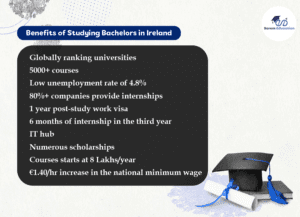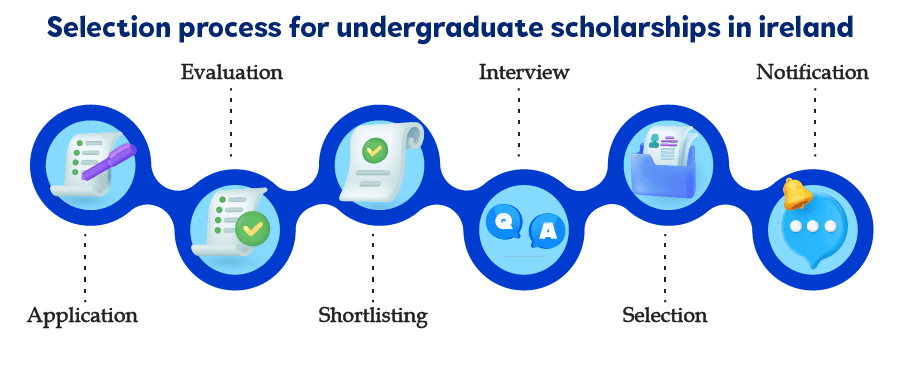Guide to Bachelor’s in Ireland for International Students [2025]

Welcome to the Emerald Gateway, Ireland, where dreams take flight and opportunities are everywhere! 🍀 It is excellent for international students to study bachelors in Ireland.
| A 4 year undergraduate degree in Ireland is referred as an Honours or Level 8 program and is the passport to earning a master’s or doctorate |
Picture this: a place with a rich history, jaw-dropping landscapes, and a top-notch education system.
Ireland shines brightly among the best countries for higher education. Unleash your academic prowess at Trinity College Dublin, University College Dublin, the University of Galway, and many globally ranking universities.
The result? A super cool, diverse learning vibe that’s as welcoming as a warm hug and high-paying careers.
But wait, there’s more! Ireland won’t break the bank when it comes to tuition fees. Compared to other Western European countries, it’s a budget-friendly option.
So, if you’re ready to dive into an unforgettable bachelor’s degree in Ireland, we are rolling out the green carpet for you. Things to keep in mind are that this is all relevant to a four-year honours degree in Ireland.
Benefits of Studying Bachelor’s in Ireland
1. Affordable, top-notch education system:
- Ireland’s education system is globally recognized for its world-class quality.
- Eight Irish universities are consistently ranked among the top 500 in the world.
- The cost of a bachelor’s degree in Ireland ranges from €18,000 to €30,000 annually, or roughly INR 16–27 lakhs.
2. Self-motivated education pattern:
- Do you usually open the book right before an exam? Not any longer. Ireland’s educational system is well known for encouraging independent learning, and this approach is ingrained in you from the start.
3. Welcoming environment:
- The Irish people’s warm and welcoming nature ensures international students feel at home.
- All Irish universities and colleges prioritize their international students’ help cell, enriching the educational experience.
- From historic castles to exciting music festivals, Ireland has abundant cultural activity and history to discover.
4. Career opportunities:
- Ireland is an innovation and entrepreneurship hub, hosting multinational companies and tech giants like Facebook, LinkedIn, Google, Microsoft, and many more.
- Almost all level 8 courses in Ireland include a 6-month internship during the third year.
- According to reports, 83% of Irish bachelorette students find employment within nine months of graduation. [Source: IrishTimes]
5. Industry connections:
- Students benefit from valuable internship and networking opportunities, setting them up for career success.

What is the difference between Bachelor’s and a Bachelor’s Honours Degree?
| Bachelors degree (Level 7) | Honours degree (Level 8) |
| 3 years for graduation | 4 years for graduation |
| Every topic covered in the three years aligns with the level 8 curriculum. | The fourth year of this programme distinguishes it from level 7. It provides a deeper understanding of the chosen field of study as well as a major project for specialisation. |
Graded as follows:
| Graded as follows:
|
| Only certain level 7 programs directly qualify you for a master’s degree (level 9). | You are eligible for a Level 9 study if you have received a grade scale of 2.1 or 2.2 in any Level 8 program. |
| Includes no stay-back option after graduation | After graduating, students have the option to stay back for a year. |
Universities in Ireland for Bachelor’s Degrees:
Ireland Universities | Global Ranking 2024 |
| Trinity College Dublin (TCD) | 81 |
| University College Dublin (UCD) | 171 |
| University of Galway | 289 |
| University College Cork (UCC) | 292 |
| University of Limerick (UL) | 426 |
| Dublin City University (DCU) | 436 |
| Maynooth University | 801-850 |
| Technological University Dublin (TUDublin) | 851-900 |
| Munster Technological University (MTU) | – |
| Atlantic Technological University (ATU) | – |
| South East Technological University (SETU) | – |
| Technological University of the Shannon (TUS) | – |
Private Colleges for Bachelor’s Degrees in Ireland:
Here are the best private colleges and institutes of technology in Ireland that offer Bachelor’s degrees to international students:
- Dublin Business School (DBS)
- National College of Ireland (NCIRL)
- Griffith College Dublin
- IBAT College
- National College of Art & Design (NCAD)
- Dundalk Institute of Technology
All these private colleges in Ireland have many excellent academic programs! They’ve got everything from business and computing to the arts and law.
They are as important as the Irish universities and help spread all-inclusive education in the country.
Undergraduate Admission Requirements in Ireland
Admission requirements for undergraduate programs in Ireland for international students may vary depending on the university and the course chosen. However, some general requirements include:
- Academic qualifications: International students must have completed 12th grade with a minimum of 60% in qualifying exams.You can improve your chances of being shortlisted for top universities by achieving a score of 70% or above.
- English language proficiency: International students from non-English speaking countries must demonstrate proficiency in the language. The commonly accepted English language tests include IELTS, TOEFL, Duolingo, or PTE, and their minimum scores may vary depending on the university and the course.
- Application documents: International students must submit various documents, such as transcripts, a statement of purpose, recommendation letters, and work experience (if applicable).
- Application fee: Most universities in Ireland charge an application fee, which varies based on the college and course.
| Read more: The Application Process for Ireland in 6 Steps [the most-detailed explanation] |
Cost of Studying in Ireland
| University | Undergraduate tuition fee |
| Trinity College Dublin | €18,250 – €28,250 |
| University College Dublin | €22,600 – €29,100 |
| University of Galway | €18,500 – €26,500 |
| University College Cork | €16,700 – €23,000 |
| University of Limerick | €11,616 – €30,000 |
| Dublin City University | €15,000 – €16,000 |
| Maynooth University | €16,500 – €18,000 |
| Technological University Dublin | €13,500 – €14,500 |
| Munster Technological University | €13,500 |
| Atlantic Technological University | €10,500 |
| South East Technological University | €13,500–€14,500 |
| Technological University of the Shannon | €12,500 |
| Dublin Business School | €10,050 |
| Griffith College Dublin | €12,000 |
| National College of Ireland | €10,000 |
Cost of Living in Ireland
Students’ average cost of living in Ireland ranges from €800 to €1,500 per month, including expenses such as accommodation, food, transport, healthcare, and miscellaneous costs.
| Expense Category | Average Monthly Cost (€) | Average Monthly Cost (INR) |
| Accommodation | €400 – €1,000 | ₹36,400 – ₹90,800 |
| Transport & Travel | €140 | ₹12,800 |
| Food | €200 | ₹18,200 |
| Utilities | €70 | ₹6,400 |
| Books/Study Materials | €90 | ₹8,000 |
| Clothes | €60 | ₹5,500 |
| Medical Facilities | €90 | ₹8,000 |
| Social Life/Miscellaneous | €80 | ₹7,200 |
Scholarships for Bachelors in Ireland for International Students
| University/College | Scholarships | Waiver |
| Trinity College Dublin | Global Excellence Undergraduate Scholarships | ₹3,000 – ₹5,000 |
| University College Dublin | Global Excellence Scholarships | 50% – 100% tuition fee waiver |
| University of Galway | Global Achievement Scholarship | ₹2,000 |
| University of Limerick | International Merit-based Scholarship | ₹1,500 |
| Dublin City University | DCU Merit Scholarships | Partial scholarship |
| Maynooth University | W.A. Barrett Scholarship in Engineering | €3,000 |
| Dublin Business School | Overseas scholraship | €500 |
| Griffith College Dublin | Undergraduate scholraship | €500 – €1,500 |
| National College of Ireland | Undergraduate Academic Scholarship | €2,000 |
Additionally, there are many other scholarships available for international students in Ireland, such as government-sponsored scholarships, university-specific scholarships, and subject-specific scholarships.
Pro tip: It’s wise to look into and apply for several scholarships. That way, you boost your chances of getting financial help for your studies in Ireland. Get them!

Student Life and Support for International Students in Ireland
Universities in Ireland have your back with a bunch of support services. They have orientation programs, academic advice, counseling, and career guidance.
Plus, many universities have special offices just for international students. They’re like your go-to pals, helping with visas, finding a place to stay, and fitting into the culture.
But hold on, there’s more!
Ireland is not just about hitting the books – it’s about making memories and having a blast! Whether you’re into sports or music, there’s something for everyone in Ireland’s lively student community.
| Read more: Safety Tips for International Students in Ireland |
Career Opportunities after Bachelor’s in Ireland
Ever thought about doing a degree that comes with a 6-month internship? Well, that’s what you get in a bachelor’s degree in Ireland. Wondering what comes next after graduation? Let’s dive in and find out!
Once you finish your bachelor’s in Ireland, you can check out loads of job options in different fields. Some cool picks after your undergrad degree in Ireland are:
- Computer Science and Information Technology:
Dive into the tech world with jobs like software developers, data analysts, and cybersecurity specialists. These gigs are cool and pay well because of the high demand for tech skills.
| Average base pay: €47,000/year |
- Business and Management:
Ireland’s business scene is booming; they’re always looking for talented pros. If you’re into business, you’re like gold – super valuable and well-compensated in the job market.
| Average base pay: €39,000/year |
- Engineering:
With some of Europe’s biggest tech companies calling Ireland home, engineering grads are a hot commodity. Jobs like mechanical engineers and chemical engineers are in high demand.
| Average base pay: €46,000/year |
- Finance and Accounting:
Jump into the financial world with roles like accountants and financial analysts. Ireland’s financial landscape thrives, offering grads a chance to make their mark in finance.
| Average base pay: €39,000/year |
- Health Science:
Ireland’s health sector opens up many career paths for health science buffs. You can contribute to managing, researching, and promoting public health initiatives and healthcare services.
| Average base pay: €33,000/year |
- Marketing:
Ireland’s growing marketing scene, and they’re looking for creative minds. Jobs like digital marketers, marketing analysts, and brand specialists are in demand, offering exciting opportunities to make your mark in the marketing world.
| Average base pay: €39,000/year |
- Hospitality and Tourism:
Ireland’s becoming a hot holiday spot, and grads can snag jobs in hotels, restaurants, and other tourism gigs. It’s not just a job; it’s a chance to be part of Ireland’s rising tourism scene.
| Average base pay: €36,000/year |
Conclusion: Why Ireland is the ideal destination for international students
In a nutshell, Ireland is the perfect spot for international students aiming for a bachelor’s degree.
And here’s the sweet deal – Ireland won’t break the bank. With reasonable tuition, scholarships, and financial aid, it’s a smart choice for international students. The friendly vibes make you feel right at home, and there’s always something exciting to explore in Ireland’s cultural and natural wonders.
But wait, there’s more! Ireland has a booming economy and excellent policies for businesses. That means tons of job opportunities, whether you’re planning to work in Ireland or jet off to explore jobs in other European spots. Studying undergraduate in Ireland is like opening a treasure chest of possibilities.
| Looking for admission help? |
FAQs
1. What level is an Irish bachelor’s degree?
A regular bachelor’s degree is normally granted following three years of study and is regarded as a Level 7 qualification. An honours bachelor’s degree, on the other hand, is classified as a Level 8 qualification and is typically awarded after 3-4 years of study.
2. What is the difference between bachelor’s and honours bachelor’s degrees in Ireland?
In Ireland, an ordinary bachelor’s degree is awarded after three years of study, while an honors bachelor’s degree is awarded after four years of study.
An honours degree has a more focused curriculum, lets you specialise in one or two areas, and needs more academic success as it is the gateway for postgraduate studies. A regular bachelor’s degree, on the other hand, demonstrates a solid understanding of the subject. Here, you delve into each subject independently.
3. Is Ireland good for a bachelor’s degree?
Ireland is a good destination for a bachelor’s degree. The universities in Ireland provide rigorous, high-quality learning while offering accommodating study environments. They are well-known for their extensive research, scientific contributions, award-winning lecturers, and internship opportunities.
Request a Call Back
Comments are closed.
